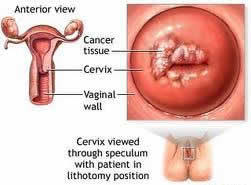Cervical Cancer Treatment In India
Treatment and Diagnosis:
If a woman has a symptom or Pap test results that suggest precancerous cells or cancer of the cervix, her doctor will suggest other procedures to make a diagnosis.
These may include:- Colposcopy: The doctor uses a colposcope to look at the cervix. The colposcope combines a bright light with a magnifying lens to make tissue easier to see. It is not inserted into the vagina. A colposcopy is usually done in the doctor's office or clinic.
- Biopsy : The doctor removes tissue to look for precancerous cells or cancer cells. Most women have their biopsy in the doctor's office with local anesthesia. A pathologist checks the tissue with a microscope.
- Punch biopsy: The doctor uses a sharp, hollow device to pinch off small samples of cervical tissue.
- LEEP: The doctor uses an electric wire loop to slice off a thin, round piece of tissue.
- Endocervical curettage: The doctor uses a curette (a small, spoon-shaped instrument) to scrape a small sample of tissue from the cervical canal. Some doctors may use a thin, soft brush instead of a curette.
- Conization: The doctor removes a cone-shaped sample of tissue. A conization, or cone biopsy, lets the pathologist see if abnormal cells are in the tissue beneath the surface of the cervix. The doctor may do this test in the hospital under general anesthesia. Conization also may be used to remove a precancerous area.
Removing tissue from the cervix may cause some bleeding or other discharge. The area usually heals quickly. Women may also feel some pain similar to menstrual cramps. Medicine can relieve this discomfort.
For more information about tests, cell changes, and treatment for these changes, you may want to read Understanding Cervical Changes.
You may want to ask the doctor these questions before having a procedure:
- Which test(s) do you recommend?
- How will the test be done?
- Will I have to go to the hospital?
- How long will it take? Will I be awake? Will it hurt?
- Are there any risks? What are the chances of infection or bleeding after the procedure?
- Can the test affect my ability to get pregnant and have children?
- How soon will I know the results? Who will explain them to me?
If I do have cancer, who will talk to me about the next steps? When?
Staging
If the biopsy shows that you have cancer, your doctor will do a thorough pelvic exam and may remove additional tissue to learn the extent (stage) of your disease. The stage tells whether the tumor has invaded nearby tissues, whether the cancer has spread and, if so, to what parts of the body.
These are the stages of cervical cancer:
- Stage 0: The cancer is found only in the top layer of cells in the tissue that lines the cervix. Stage 0 is also called carcinoma in situ.
- Stage I: The cancer has invaded the cervix beneath the top layer of cells. It is found only in the cervix.
- Stage II: The cancer extends beyond the cervix into nearby tissues. It extends to the upper part of the vagina. The cancer does not invade the lower third of the vagina or the pelvic wall (the lining of the part of the body between the hips).
- Stage III: The cancer extends to the lower part of the vagina. It also may have spread to the pelvic wall and nearby lymph nodes.
- Stage IV: The cancer has spread to the bladder, rectum, or other parts of the body.
- Recurrent cancer: The cancer was treated, but has returned after a period of time during which it could not be detected. The cancer may show up again in the cervix or in other parts of the body.
To learn the extent of disease and suggest a course of treatment, the doctor may order some of the following tests:
- Chest x-rays: X-rays often can show whether cancer has spread to the lungs.
- CT scan: An x-ray machine linked to a computer takes a series of detailed pictures of your organs. You may receive contrast material by injection in your arm or hand, by mouth, or by enema. (Some people are allergic to contrast materials that contain iodine. Tell your doctor or nurse if you have allergies.) The contrast material makes abnormal areas easier to see. A tumor in the liver, lungs, or elsewhere in the body can show up on the CT scan.
- MRI: A powerful magnet linked to a computer is used to make detailed pictures of your pelvis and abdomen. The doctor can view these pictures on a monitor and can print them on film. An MRI can show whether cancer has spread. Sometimes contrast material makes abnormal areas show up more clearly on the picture.
- Ultrasound: An ultrasound device is held against the abdomen or inserted into the vagina. The device sends out sound waves that people cannot hear. The waves bounce off the cervix and nearby tissues, and a computer uses the echoes to create a picture. Tumors may produce echoes that are different from the echoes made by healthy tissues. The picture can show whether cancer has spread.
Treatment

- Getting a Second Opinion
- Preparing for Treatment
- Methods of Treatment
- Surgery
- Radiation Therapy
- Chemotherapy
Many women with cervical cancer want to take an active part in making decisions about their medical care. It is natural to want to learn all you can about your disease and your treatment choices. However, shock and stress after the diagnosis can make it hard to think of everything you want to ask the doctor. It often helps to make a list of questions before an appointment.
To help remember what the doctor says, you may take notes or ask whether you may use a tape recorder. You may also want to have a family member or friend with you when you talk to the doctor - to take part in the discussion, to take notes, or just to listen.
You do not need to ask all your questions at once. You will have other chances to ask your doctor to explain things that are not clear and to ask for more information.
Your doctor may refer you to a specialist, or you may ask for a referral. Gynecologists, gynecologic oncologists, medical oncologists, and radiation oncologists are specialists who treat cervical cancer.
Getting a Second Opinion
Before starting treatment, you might want a second opinion about the diagnosis and treatment plan. Many insurance companies cover a second opinion if you or your doctor requests it. It may take some time and effort to gather medical records and arrange to see another doctor. Usually it is not a problem to take several weeks to get a second opinion. In most cases, the delay in starting treatment will not make treatment less effective. To make sure, you should discuss this delay with your doctor. Some women with cervical cancer need treatment right away.
There are a number of ways to find a doctor for a second opinion:
- Your doctor may refer you to one or more specialists. At cancer centers, several specialists often work together as a team.
- NCI's Cancer Information Service, at 1-800-4-CANCER, can tell you about nearby treatment centers. Information Specialists also can provide online assistance through LiveHelp at http://www.cancer.gov.
- A local or state medical society, a nearby hospital, or a medical school can usually provide the names of specialists in your area.
- The American Board of Medical Specialties (ABMS) has a list of doctors who have had training and passed exams in their specialty. You can find this list in the Official ABMS Directory of Board Certified Medical Specialists. This Directory is in most public libraries. Or you can look up doctors at http://www.abms.org. (Click on "Who's Certified.")
- The NCI provides a helpful fact sheet called "How To Find a Doctor or Treatment Facility If You Have Cancer."
Preparing for Treatment
The choice of treatment depends mainly on the size of the tumor and whether the cancer has spread. If a woman is of childbearing age, the treatment choice may also depend on whether she wants to become pregnant someday.
Your doctor can describe your treatment choices and the expected results of each. You and your doctor can work together to develop a treatment plan that meets your medical needs and personal values.
You may want to ask the doctor these questions before treatment begins:
- What is the stage of my disease? Has the cancer spread? If so, where?
- What are my treatment choices? Which do you recommend for me? Will I have more than one kind of treatment?
- What are the expected benefits of each kind of treatment?
- How will treatment affect my normal activities?
- What can I do to take care of myself during treatment?
- How long will treatment last?
- Will I have to stay in the hospital?
- What is the treatment likely to cost? Does my insurance cover this treatment?
- How often should I have checkups?
- Would a clinical trial (research study) be appropriate for me?
Methods of Treatment
Women with cervical cancer may be treated with surgery, radiation therapy, chemotherapy, radiation therapy and chemotherapy, or a combination of all three methods.
At any stage of disease, women with cervical cancer may have treatment to control pain and other symptoms, to relieve the side effects of therapy, and to ease emotional and practical problems. This kind of treatment is called supportive care, symptom management, or palliative care.
You may want to talk to your doctor about taking part in a clinical trial, a research study of new treatment methods. The section on "The Promise of Cancer Research" has more information about clinical trials.
Surgery
Surgery treats the cancer in the cervix and the area close to the tumor.
Most women with early cervical cancer have surgery to remove the cervix and uterus (total hysterectomy). However, for very early (Stage 0) cervical cancer, a hysterectomy may not be needed. Other ways to remove the cancerous tissue include conization, cryosurgery, laser surgery, or LEEP.
Some women need a radical hysterectomy. A radical hysterectomy is surgery to remove the uterus, cervix, and part of the vagina.
With either total or radical hysterectomy, the surgeon may remove both fallopian tubes and ovaries. (This procedure is a salpingo-oophorectomy.)
The surgeon may also remove the lymph nodes near the tumor to see if they contain cancer. If cancer cells have reached the lymph nodes, it means the disease may have spread to other parts of the body.
You may want to ask the doctor these questions about surgery:
- What kind of operation will I have? Will my ovaries be removed?
- Do I need to have lymph nodes removed? Will other tissues be removed? Why?
- How will I feel after the operation?
- If I have pain, how will it be controlled?
- How long will I have to stay in the hospital?
- Will I have any lasting side effects? If I don't have a hysterectomy, will I be able to get pregnant and have children? Is there increased risk of miscarriage?
- When will I be able to resume normal activities?
- How will the surgery affect my sex life?
Phone Numbers Reach Us -
India & International : +91 9371770341
Radiation Therapy
Radiation therapy (also called radiotherapy) uses high-energy rays to kill cancer cells. It affects cells only in the treated area.
Women have radiation therapy alone, with chemotherapy, or with chemotherapy and surgery. The doctor may suggest radiation therapy instead of surgery for the small number of women who cannot have surgery for medical reasons. Most women with cancer that extends beyond the cervix have radiation therapy and chemotherapy. For cancer that has spread to distant organs, radiation therapy alone may be used.
Doctors use two types of radiation therapy to treat cervical cancer. Some women receive both types:
- External radiation: The radiation comes from a large machine outside the body. The woman usually has treatment as an outpatient in a hospital or clinic. She receives external radiation 5 days a week for several weeks.
- Internal radiation (intracavitary radiation): Thin tubes (also called implants) containing a radioactive substance are left in the vagina for a few hours or up to 3 days. The woman may stay in the hospital during that time. To protect others from the radiation, the woman may not be able to have visitors or may have visitors for only a short period of time while the tubes are in place. Once the tubes are removed, no radioactivity is left in her body. Internal radiation may be repeated two or more times over several weeks.
You may want to ask the doctor these questions before having radiation therapy:
- What is the goal of this treatment?
- How will the radiation be given?
- Will I need to stay in the hospital? If so, for how long?
- When will the treatments begin? When will they end?
- How will I feel during therapy? Are there side effects?
- How will we know if the radiation therapy is working?
- Will I be able to continue my normal activities during treatment?
- How will radiation therapy affect my sex life?
- Will I be able to get pregnant and have children after my treatment is over?
Chemotherapy
Chemotherapy uses anticancer drugs to kill cancer cells. It is called systemic therapy because the drugs enter the bloodstream and can affect cells all over the body. For treatment of cervical cancer, chemotherapy is generally combined with radiation therapy. For cancer that has spread to distant organs, chemotherapy alone may be used.
Anticancer drugs for cervical cancer are usually given through a vein. Women usually receive treatment in an outpatient part of the hospital, at the doctor's office, or at home. Rarely, a woman needs to stay in the hospital during treatment.
You may want to ask the doctor these questions before having chemotherapy:
- Why do I need this treatment?
- Which drug or drugs will I have?
- How do the drugs work?
- What are the expected benefits of the treatment?
- What are the risks and possible side effects of treatment? What can we do about them?
- When will treatment start? When will it end?
- How will treatment affect my normal activities?
Side Effects of Treatment
- Surgery
- Radiation Therapy
- Chemotherapy
Because cancer treatment often damages healthy cells and tissues, unwanted side effects are common. Side effects depend mainly on the type and extent of the treatment. Side effects may not be the same for each woman, and they may change from one treatment session to the next. Before treatment starts, your health care team will explain possible side effects and suggest ways to help you manage them.
The NCI provides helpful booklets about cancer treatments and coping with side effects. These include Radiation Therapy and You, Chemotherapy and You, and Eating Hints for Cancer Patients.
Surgery
It takes time to heal after surgery, and the recovery time is different for each woman. You may be uncomfortable for the first few days. However, medicine can usually control the pain. Before surgery, you should discuss the plan for pain relief with your doctor or nurse. After surgery, your doctor can adjust the plan if you need more pain relief.
If you have surgery to remove a small tumor on the surface of the cervix, you may have cramping or other pain, bleeding, or a watery discharge.
If you have a hysterectomy, the length of the hospital stay may vary from several days to a week. It is common to feel tired or weak for a while. You may have problems with nausea and vomiting, and you may have bladder and bowel problems. The doctor may restrict your diet to liquids at first, with a gradual return to solid food. Most women return to their normal activities within 4 to 8 weeks after surgery.
After a hysterectomy, women no longer have menstrual periods. They cannot become pregnant.
When the ovaries are removed, menopause occurs at once. Hot flashes and other symptoms of menopause caused by surgery may be more severe than those caused by natural menopause. You may wish to discuss this with your doctor before surgery. Some drugs have been shown to help with these symptoms, and they may be more effective if started before surgery.
After surgery, some women may be concerned about sexual intimacy. Many women find that it helps to share these concerns with their partner. A couple may want to ask a counselor to help them express their concerns.
Radiation Therapy
Side effects depend mainly on the dose of radiation and the part of your body that is treated. Radiation to the abdomen and pelvis may cause nausea, vomiting, diarrhea, or urinary problems. You may lose hair in your genital area. Also, your skin in the treated area may become red, dry, and tender.
You may have dryness, itching, or burning in your vagina. The radiation may also make your vagina narrower. The doctor or nurse may suggest ways to relieve discomfort. There also are ways to expand the vagina, which will help make follow-up exams easier. Your doctor may advise you not to have intercourse during treatment. But most women can resume sexual activity within a few weeks after treatment ends.
You are likely to become very tired during radiation therapy, especially in the later weeks of treatment. Resting is important, but doctors usually advise patients to try to stay as active as they can.
Although the side effects of radiation therapy can be distressing, your doctor can usually find ways to relieve them.
Chemotherapy
The side effects of chemotherapy depend mainly on the specific drugs and the dose. The drugs affect cancer cells and other cells that divide rapidly:
- Blood cells: These cells fight infection, help your blood to clot, and carry oxygen to all parts of the body. When drugs affect your blood cells, you are more likely to get infections, bruise or bleed easily, and feel very weak and tired.
- Cells in hair roots: Chemotherapy can cause you to lose your hair. The hair will grow back, but it may be somewhat different in color and texture.
- Cells that line the digestive tract: Chemotherapy can cause a poor appetite, nausea and vomiting, diarrhea, or mouth and lip sores.
The drugs used for cervical cancer also may cause skin rash, hearing problems, loss of balance, joint pain, or swollen legs and feet.
Your doctor can suggest ways to control many of these side effects.
Phone Numbers Reach Us -
India & International : +91 9371770341





































